environment can help practitioners to support children's understanding
of numbers and counting. Nicole Weinstein looks at some useful
approaches and suggests some ways to aid learning.

Children's understanding of number starts from birth. They have a natural ability to sort objects and to discriminate between one, two and three objects, to recognise patterns, such as five, ten, 15, 20, and to problem-solve - all essential skills for learning about maths. Practitioners can support children's ability to count reliably from one to 20 by introducing rhymes and songs about counting, providing heuristic play collections and creating a number-rich environment where counting becomes a part of their everyday lives.
Judith Stevens, an independent early years consultant specialising in maths and early language, says, 'Practitioners have a huge role to play in sustaining children's developing understanding of number - through modelling the use of number language in meaningful, relevant situations and the provision of a number-rich environment, filled with resources that children actually want to explore, sort and count.'
She continues, 'These items aren't always "maths" resources from educational catalogues. Practitioners should supplement these with collections of things that excite and motivate children. By being really tuned in to children's current passions and enthusiasms, practitioners can identify that children may want to compare and count cars, minibeasts, badges, key rings or memorabilia from the latest blockbuster DVD or craze. Practitioners need to remember that maths happens throughout the indoor environment, not simply in the "maths learning zone", which may simply be a great place to store resources to be used everywhere.'
Practitioners also need to be aware of the principles of counting, so they can observe children's current development and plan effectively for future learning (see box).
UNDER-TWOS
Baby and toddler rooms should include a variety of resources that support children's developing understanding of numbers and counting. After all, babies as young as five months are aware of quantities and notice changes in amounts of objects, explains Ms Stevens. 'Before the age of one year, children develop an awareness of number names, and with the right support from the adults around them, use these in their speech as soon as they talk. Children hear talk all around them and are introduced to number through opportunities that occur in everyday life.'
Practitioners should use counting songs, rhymes and stories - for example, Round and Round the Garden; This Little Piggy Went to Market; One, Two, Three, Four, Five, Once I Caught a Fish Alive; The Three Bears; and Three Little Pigs.
Children also need opportunities within their play and daily routines to organise, order, sequence and classify objects and quantities. Treasure basket collections will encourage the youngest babies to handle large numbers of interesting objects made from natural materials. Other collections could include balls, spoons, cotton reels or scarves for the babies to handle independently.
Linda Thornton, education consultant to Morleys, says, 'Once the babies are mobile, practitioners can extend their heuristic play by providing a range of resources such as bottles, boxes, tins, pegs, shells, stones, wooden balls, shapes and rings to enable the children to practise building, sorting, ordering, filling, emptying, posting and transporting. All of these activities encourage the toddlers to begin to develop their understanding of numbers, counting and calculating.'
Resources
Here are some useful resources:
Wooden Collection for Treasure Basket (£21.99) and the Heuristic Play Starter Set (£77.99) from www.reflectionsonlearning.co.uk
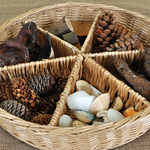 Wooden Tokens - 50 pieces (£10.99); Bag of Corks (£2.69); Mixed Colour River Stones (£1.99); Soft Touch Counting Cones (£9.95); Hex'citing Bowls (£2.50 for a pack of seven); Counting Bowls (£9.95 for a pack of ten); Ascending Wooden Sorting Tray (£13.95); Wicker Sorting Round (£12.95); Sorting Bamboo (£7.99) and Silver Sorting Bowls (£6.99), all from Cosy Direct on 01332 370152.
Wooden Tokens - 50 pieces (£10.99); Bag of Corks (£2.69); Mixed Colour River Stones (£1.99); Soft Touch Counting Cones (£9.95); Hex'citing Bowls (£2.50 for a pack of seven); Counting Bowls (£9.95 for a pack of ten); Ascending Wooden Sorting Tray (£13.95); Wicker Sorting Round (£12.95); Sorting Bamboo (£7.99) and Silver Sorting Bowls (£6.99), all from Cosy Direct on 01332 370152.
Natural Sorting Stones (£15) and the Natural Sorting Tray (£12) from www.yellow-door.net.
Mini Posting Tubes (£15.95) from Cosy provide great opportunities for counting objects as they are posted in or appear out of the ends of pipes or guttering.
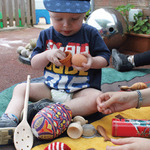 The Egg and Spoon Collection (£60), the Hide and Seek Collection (£60) and the Treasure basket Starter Set (£117) from www.playtoz.co.uk.
The Egg and Spoon Collection (£60), the Hide and Seek Collection (£60) and the Treasure basket Starter Set (£117) from www.playtoz.co.uk.
Bamboo Claves (£9.99 for five pairs) and the Large Set - Little Hands Starter Set (£59.95), both from Cosy, are great for developing mathematical understanding of counting through counting beats and copying and creating rhythms.
Stacking Cup Set (£5.95), with numbers and letters from www.thechildmindingshop.co.uk
TWO-YEAR-OLDS TO THREE-YEAR-OLDS
Practitioners who work with two- and three-year-olds should provide an enabling environment that encourages mathematical exploration and thinking. For example, the water tray can be used for fishing games, panning for gold and other treasures, counting animals in and out of Mr Gumpy's boat or counting how many scoops or bottles of water it takes to fill different containers.
Create small-world scenarios that encourage mathematical play: pirates searching for treasure; gardens of minibeasts to be hunted; pebbles to be moved by construction workers; speckled frogs to jump into ponds, and moon rocks to be collected by astronauts.
Role play provides opportunities for counting and linking it to real-life scenarios. 'Cooking' in the home corner allows children to explore the counting experiences they see at home every day, such as preparing food and laying the table, while role-play 'shopping' enables children to explore money, quantity and measure.
Clever use of mirrors can also foster an understanding of counting. Ms Thornton explains, 'As well as developing their spatial awareness, the mirrors encourage the children to recognise and count different quantities, to use the language of counting such as "lots", "more" or "less" and to create patterns and arrangements with different quantities of objects.'
Resources
Here are some useful resources:
Dino Skulls (£13.99 for a pack of 24); Metal Detector (£10.25); Number Fun Ducks (£13.89 for 10); Blue Water Balls (£1.99 for 10g); Bucket of Gold Stones (£9.99), from Cosy, are good for maths in the sand and water tray.
Softie Mirror Exploratory (£67.99); Softie Four Way Mirror (£39.99); Giant Wall Mirror (£83.94), all from www.reflectionsonlearning.co.uk.
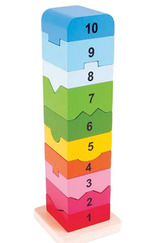 Natural Mud Pie Tea Set (£27.95); Three Bears Rustic Porridge Set (£24.99); Bulk Pack Pirate Coins, (£2.95); Role Play Outdoor Shop (£195) and Robust Till (£24.75), are great resources for the role-play area, all from Cosy.
Natural Mud Pie Tea Set (£27.95); Three Bears Rustic Porridge Set (£24.99); Bulk Pack Pirate Coins, (£2.95); Role Play Outdoor Shop (£195) and Robust Till (£24.75), are great resources for the role-play area, all from Cosy.
Squidgy Sparkle Numbers (£18.99); Basket of Bunnies (£69.95) and Metallic Elephant Number Parade (£49.95), all from www.tts-group.co.uk.
Problem Solving and Numeracy Complete Set (£210) from www.playtoz.co.uk contains treasure basket items and activity cards that support children's ongoing mathematical development.
Jumbo Number Pebbles (£30) from www.yellow-door.net; Logic Camels (£23.30) from www.wesco-eshop.co.uk, and Aesthetic Ladybird Counters (£18.49) from Cosy.
Farmers' Market Sorting Set (£37.95) and Cedric the Counterpillar (£21.95) from www.hope-education.co.uk
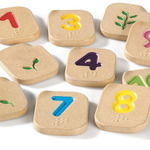 1-10 Tray Puzzle (£7.10) and Eco Designed Braille Numbers 1-10 (£10.80), both from www.wesco-eshop.co.uk; the Number Tower (£16.95) from www.hope-education.co.uk, or Giant Fishing Game 1-20 (£62.95) and 1-20 Number Beads (£19.99) both from www.ypo.co.uk; Caravan of Elephants Educational Sequencing Puzzle (£12.45); Ten Green Bottles Counting Song Foam Masks (£6.70) and Groovie Maths Blocks - Wooden Toy Blocks by Uncle Goose (£47.99), all from www.thechildmindingshop.co.uk
1-10 Tray Puzzle (£7.10) and Eco Designed Braille Numbers 1-10 (£10.80), both from www.wesco-eshop.co.uk; the Number Tower (£16.95) from www.hope-education.co.uk, or Giant Fishing Game 1-20 (£62.95) and 1-20 Number Beads (£19.99) both from www.ypo.co.uk; Caravan of Elephants Educational Sequencing Puzzle (£12.45); Ten Green Bottles Counting Song Foam Masks (£6.70) and Groovie Maths Blocks - Wooden Toy Blocks by Uncle Goose (£47.99), all from www.thechildmindingshop.co.uk
FOUR-YEAR-OLDS TO FIVE-YEAR-OLDS
When working with older children, create a number rich environment - number lines up to 20 that reflect the children's interests placed at child height, an variety of bought, natural and reclaimed materials readily available for children to use in counting and problem-solving and lots of number games indoors and out.
Ms Thornton says, 'Practitioners should provide the resources and opportunities for children to develop their counting and sorting skills, to identify and solve problems and to record their mathematical problems using symbols and numerals. As well as traditional counting resources these should include clipboards, money, calculators and timers which can be used during role play.'
Resources
Here are some useful resources:
Counting and Sorting Set (£47.99); Giant A4 Calculator (£9.99); 0-30 Number Line Floor Mat (£26.99), and the Outdoor Maths Kit (£109), from www.reflectionsonlearning.co.uk
The Maths Resource Collection (£325) from www.earlyexcellence.co.uk, contains a variety of small resources to explore and talk about their size, shape, how many there are, and which is longer or shorter
1-20 Outdoor Counting Line (£39.95) and the Outdoor Number Line (£64.95), both from www.tts-group.co.uk.
The Number Work Jumbo Pack (£69.95) and the Classroom Tunics (£52.50), both from www.hope-education.co.uk.
Games that support children's understanding of maths include Counting to 10 with Balloons and Rings (£26.10); Number Building (£15.90), Smallest to Biggest Cubes (£18.80), and 1-20 Abacus (£10.10), all from www.wesco-eshop.co.uk. For more physical play try Woodland Skittles (£8.99); Giant Catch Net (£49.95) and Run Around Natural Clock (£9.99), all from Cosy, or Garden Hopscotch (£16.95) and Giant Play Mats - Numbers (£35.95) from www.hope-education.co.uk.
Number lines and squares are extremely helpful for children, especially when they begin to count on and back. Try Cars Number Track Plank (£19.99); Counting Fingers Numberline (£7.95) and Giant Number Bunting 1-20 (£37.49), all from Cosy, or the A5 Number Cards (£12.99) and Magnetic Giant Ladybird + 20 spots (£15.59), from www.ypo.co.uk.
THE PRINCIPLES OF COUNTING
Practitioners need to be aware of the various stages of a child's mathematical development, so they can observe and plan effectively for future learning.
As counting skills develop, children begin to understand:
- one-to-one correspondence - when children touch or point to each object individually as they count and match a number to each object that is being counted
- the need for stable order - children will gradually realise that numbers need to be said in the same order
- abstraction - children may begin by counting objects like cars 'in the here and now', in front of them, but they will also realise that anything can be counted as they can count claps or jumps too
- order irrelevance - when counting a group of objects in a random layout, it doesn't matter where you start, whether you start at the top, bottom, middle or edges the result is the same as long as each item is counted once
- cardinality - understanding that the last number counted indicates how many things are in the set.
- From The Foundations of Mathematics: an active approach to number, shape and measures in the early years by C Skinner and J Stevens.
CASE STUDY: FRIARS PRIMARY AND NURSERY IN SHOEBURYNESS, ESSEX
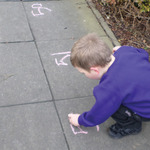 Children at Friars Primary School and Nursery in Shoeburyness love maths. 'They don't realise they are learning maths because it's so integrated into the early years curriculum and it's taught in such a subtle, fun way with lots of whole-body movement that they think it's a game,' explains early years and Year One leader Elaine Bennet.
Children at Friars Primary School and Nursery in Shoeburyness love maths. 'They don't realise they are learning maths because it's so integrated into the early years curriculum and it's taught in such a subtle, fun way with lots of whole-body movement that they think it's a game,' explains early years and Year One leader Elaine Bennet.
Ms Bennett, who is also an independent early years consultant who trains teachers in early maths, says that as the expectation in mathematical development has increased, there is a tendency for teachers to go down a more formal route, but she insists, 'You'd be surprised at how many children have difficulty with basic counting. Often, in the early years, they mistake the teens, like 13 for 30, or struggle to count accurately. If they don't get to grips with the basics in the early years, this will have repercussions as they move up the school.'
Ms Bennett advocates teaching children maths through actions and games. Each morning, the Reception class is split into four groups, according to their level of number experience. There is a tento 15-minute active maths session where the children stand up and count parts of their body out loud.
'Children love body counting. We go from one to 20, touching our head for one, shoulder for two, and moving all the way down to our feet. For those more able, we might count higher or we count from backwards, moving from feet to head. We then might do some number rhymes and play active games, perhaps where the children have to roll a large dice and then go to collect the number of toys shown,' explains Ms Bennett.
Another technique that has proved highly successful in helping children to count and gain a deeper understanding of numbers and amounts has been a simple lunch grid. 'Each morning the children put their name cards onto an empty grid. There are three columns - hot school dinner, cold school dinner or packed lunch. A graph builds as they add their lunch choices and I then ask them, "What can you tell me about the dinners today?"
'They might start off by saying this one has the most and this one has the least. I then introduce more vocabulary and ask, "Which one has the greatest amount or the fewest?"
'The key barrier is the language of maths for some children. But as the weeks go by, I am amazed at the language that's coming out of this simple, daily exercise. They are beginning to grasp the concept of counting in a real-life situation.'
When children are engaged in play, the adults are interacting and promoting the maths in every area of the classroom and outdoors. In terms of resources, they love to access the toolkits which contain a whiteboard and pen; a tape measure; a ruler; number cards and a sand timer.
Ms Bennett adds: 'We also use a resource called Numicon, which gives children a visual image of the different numbers.'
- Numicon, https://global.oup.com/education/content/primary/series/numicon/ ;jsessionid=59770576F48334182E585A3065A121BC?region=uk
- Toolkits, http://earlyyearsmaths.e2bn.org/resources_114.html
MORE INFORMATION
Development Matters in the Early Years Foundation Stage
Let's Talk about Maths! by M Jones contains practical advice and 40 great games for children aged 12 months to five years, www.yellow-door.net/active-maths/lets-talk-about-maths
Nursery World 'EYFS best practice' series on maths is at www.nurseryworld.co.uk/mathematics-in-eyfs
The Foundations of Mathematics: an active approach to number, shape and measures in the early years by C Skinner and J Stevens









